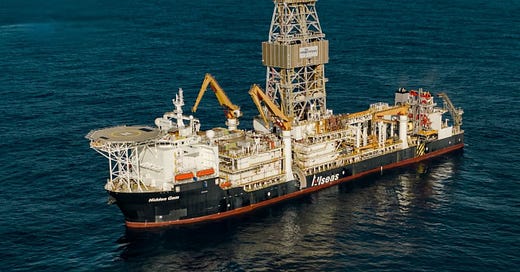Trump’s illegal push for deep-sea mining: the Swiss Connection
Will Swiss technology allow US miners to destroy one of the planet’s last pristine ecosystems?
The deep sea has emerged as the latest frontier of mineral extraction. Potato-sized lumps on the sea floors – so called polymetallic nodules – contain vast amounts of minerals such as nickel, copper, manganese and cobalt. These minerals are critical for the transition away from fossil fuels – particularly if we don’t ramp up recycling – and appear in the nodules in much higher concentrations and larger quantities than in terrestrial deposits. Mining companies are now developing technologies to suck them up through massive, vacuum cleaner-like devices.
As the World Resources Institute states, the deep sea is also “home to a dazzling array of life: to date, tens of thousands of species have been found in the deep ocean, and estimates say there could be millions more.” For now, scientists have barely begun to understand the riches and the complexities of the vast deep-sea ecosystems.
The UN Convention on the Law of the Sea has declared the oceans beyond the narrow belt of national jurisdictions a “Common Heritage of Humankind”. Seated in Jamaica, the International Seabed Authority (ISA), a UN organization, is currently developing a set of rules to regulate mining operations in the deep seas. While this process is underway, more than 30 countries including Switzerland have called for a moratorium, a pause or even a ban on deep-sea mining.
As he has done on land and in the skies, Donald Trump is now trying to blow up the science-based, diplomatic process governing the planet’s oceans. On April 24, the US President issued an Executive Order announcing immediate steps to promote the mining of polymetallic nodules and other deep-sea resources by the United States. This order blatantly contradicts the UN Convention on the Law of the Sea, which is binding on the US even if the country has never signed it, and undermines the ISA process of setting appropriate rules.
The Metals Company, a company created to promote mining in the deep seas, has promptly applied for a US permit to develop commercial deep-sea mining operations in a large area of the Pacific Ocean. The catch: As La Liberté, a Swiss newspaper, has found, The Metals Company doesn’t own the ships required to mine the seabed but will rely on a Swiss enterprise called Allseas for this task. Headquartered in the canton of Fribourg, Allseas installs offshore pipelines such as Nord Stream 2, among other activities, and owns some 15% of the shares in The Metal Company.
In the Swiss media, Allseas stated that it will “only continue the project when we are certain that it fulfills all relevant regulatory requirements”. Yet the secretary general of the ISA did not mince words on this topic. She made it clear that any unilateral action by the US government and The Metals Company “would constitute a violation of international law and directly undermine the fundamental principles of multilateralism, the peaceful use of the oceans and the collective governance framework established under [the UN Convention]”.
In an inquiry in the Swiss parliament Raphael Mahaim, a member of the Green Party, asked “what political, legal or diplomatic steps the Federal Council intend[s] to take to discourage or prevent Swiss participation in deep-sea mining projects that are contrary to international law or harmful to the environment”. The Swiss government, which supports a moratorium on deep-sea mining, has so far not issued a response and only said that it is “following the developments in the US closely”.
In his book, Material World, the British journalist Ed Conway describes Gerard Barron, the flamboyant founder of The Metals Company, as “the Indiana Jones of the deep sea”. Conway reports that Barron’s first submarine mining company failed when his relations with a host government soured. It will take a lot of public and diplomatic pressure to stop him from starting a new race to destroy one of the world’s last pristine ecosystems.




